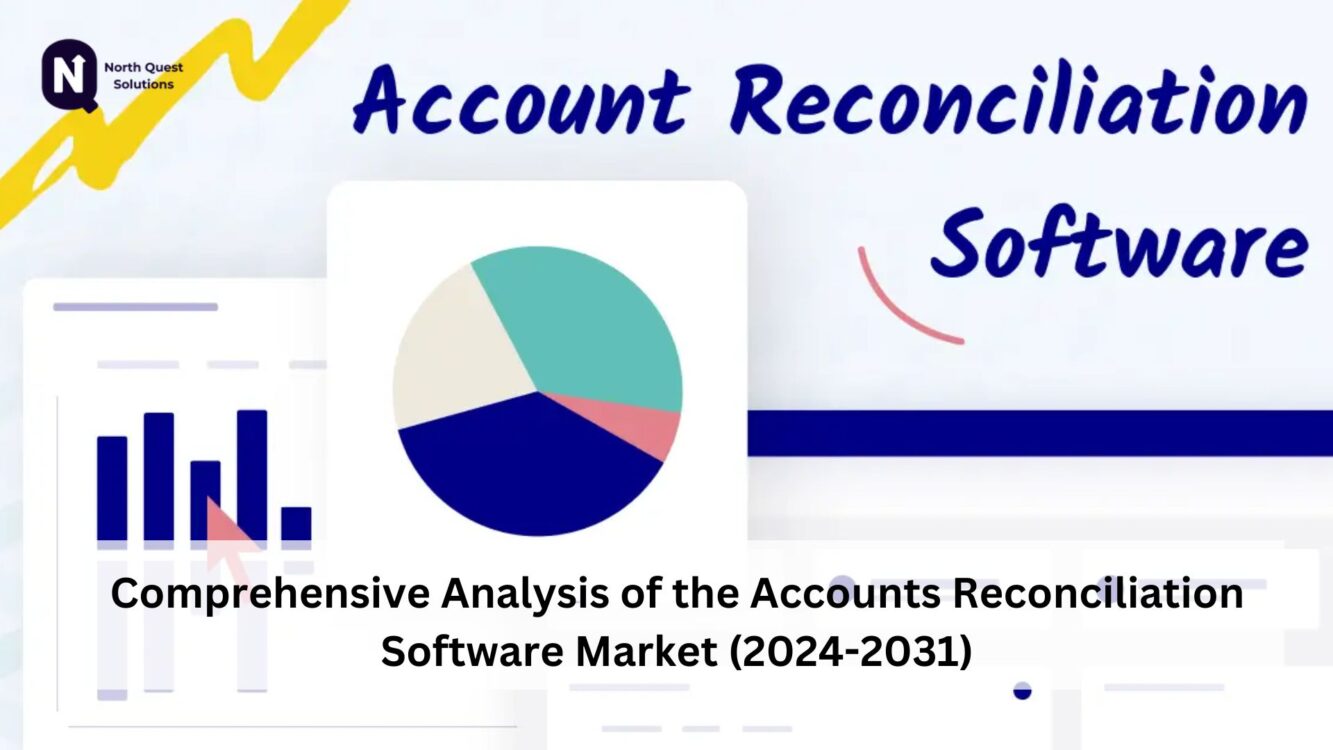
In the constantly changing financial environment, efficient reconciliation of accounts is now a necessity. For us at North Quest Solutions, we know the significance of accurate reconciliation processes to ensure financial integrity and reducing the risk of errors. This article dives into the accounting software market for reconciliation, providing insight on its expansion patterns, trends, and key factors that drive its growth from 2024 until 2031.
The Growing Need for Accounts Reconciliation Software
Market Dynamics and Growth Drivers
The marketplace in Account Reconciliation services software is growing at an unprecedented rate due to the growing the complexity in financial transactions the increasing regulatory compliance requirements, and the necessity for greater accuracy in financial reporting. Businesses across all sectors are realizing the importance of automatizing their reconciliation processes in order to avoid mistakes made by hand, reduce time and cut expenses.
- Compliance with the constantly evolving regulatory environment, businesses have to implement advanced reconciliation software to ensure compliance. This means adhering to the standards like IFRS, GAAP, and SOX that require accurate as well as timely reporting of financials.
- Operations Efficiency Automation of reconciliation of accounts streamlines processes and reduces time to close books and increases quality of financial information. This results to improved decision-making and financial performance.
- technological advances The integration with AI machines learning and AI into reconciliation software has accelerated the market’s growth. These tools provide predictive insights, anomaly detection along with continuous monitors, which makes reconciliation more efficient.
Key Market Segments
1. By Deployment Mode:
- Solution on Premises are typically favored by large corporations because of security concerns for data On-premise solutions provide full management of the application and.
- Cloud-Based Services The move to cloud-based solutions is growing in popularity particularly for SMEs due to the lower costs upfront as well as scalability and accessibility.
2. By Organization Size:
- Small and Medium Enterprises (SMEs): SMEs are increasingly embracing cloud-based reconciliation software to enhance their financial processes with little capital expenditure.
- Large-scale Enterprises Large corporations typically prefer custom, on-premise solutions that can satisfy particular compliance requirements and operational requirements.
3. By End-User Industry:
- Banking and Financial Services (BFSI): The BFSI sector is a leading user of reconciliation software, motivated by the necessity for compliance as well as the number of transactions processed daily.
- Retail Retailers use reconciliation software to control complicated payment processes along with inventory and payment systems. which ensure the accuracy of financial reports.
- Healthcare Healthcare: The industry of healthcare utilizes reconciliation software to control the billing process as well as insurance claims and compliance with regulations.
Emerging Trends in Accounts Reconciliation Software
1. Artificial Intelligence and Machine Learning Integration
AI and ML have transformed reconciliation by enabling the use of predictive analytics and real-time processing of data and automated processes that are intelligent. These tools help companies spot discrepancies and anomalies early and reduce the chance of financial mistakes.
2. Blockchain for Enhanced Security
Blockchain technology is rapidly becoming a game changer for reconciliation. The ledger’s decentralized system assures accuracy and transparency of the data which makes it much easier to check transactions and eliminate any discrepancies.
3. Increased Focus on User Experience
With the pace of competition increasing software companies are focused on improving the users’ experience through user-friendly interfaces, customized dashboards and seamless integration with current ERP systems.
Market Forecast and Future Outlook (2024-2031)
Market Size and Growth Projections
The Accounts Reconciliation Software market is expected to experience a rapid growth rate between 2024-2031, with the rate of growth compounded annually (CAGR) more than 10 percent. The need for automated, flexible, reliable reconciliation tools will increase in response to the increasing complexity of financial operations as well as the requirement for regulatory compliance.
Regional Analysis
- North America: dominates the market due the rapid adoption rate of the latest technologies as well as strict regulations.
- Europe Europe: Follows closely, with substantial investment in financial technology and compliance solutions.
- Asia-Pacific is expected to see the fastest growth, fueled by the rapid transformation of digital of economies, as well as increased regulation surveillance.
Challenges and Opportunities
Challenges
- Data Security Issues Cloud-based solutions can be flexible but they also raise questions about the security of data and compliance, especially in industries that are heavily regulated.
- Integration Problems Integration of new reconciliation software into current systems may be difficult especially for large businesses with complicated IT infrastructures.
Opportunities
- SME Market Expanding The rising use of cloud-based solutions by SMEs offers significant opportunities to market players.
- Technology Innovation The constant advances within AI, ML, and blockchain technology provide opportunities to develop more advanced and effective reconciliation tools.
Conclusion
The Accounts Reconciliation Software market is expected to see significant growth in the next years due to the necessity for the automation of processes, regulatory compliance and technological advancement. North Quest Solutions is North Quest Solutions, we strive to stay in the forefront of technological advancements, and providing our customers with cutting-edge solutions that improve their financial processes as well as ensure accurate reporting.
